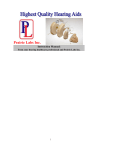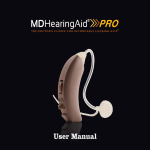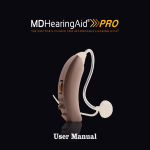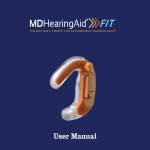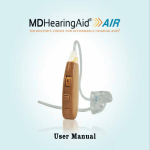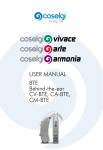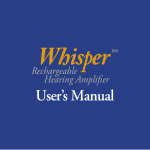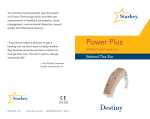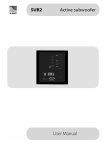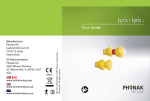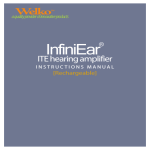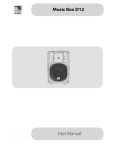Download MDHearingAid MAX User Manual
Transcript
User Manual Acoustitone MAX™ Hearing Aid www.MDHearingAid.com TABLE OF CONTENTS Congratulations 3 The MDHearingAid Story 4 Hearing Aid Diagram 5 Recommended Battery Type 6 Changing the Battery 7 Placing the Hearing Aid in your Ear 8 Turning the Hearing Aid On 9 Tone Control 10 Getting the Most from Your Hearing Aid 11 Maintenance and Care 13 In Case of Malfunction 14 Troubleshooting 15 Warranty 18 Warning to Hearing Aid Dispensers 19 Important Notice for Prospective Users 21 Return Policy 23 Notice of Cancellation 24 Technical Specifications 25 CONGRATULATIONS! As the owner of the MDHearingAid Acoustitone MAX™ hearing instrument, you may once again enjoy the sounds of your environment and conversations with your family and friends at a price you can afford. To get the most out of the MDHearingAid™, please read this brochure in its entirety. Your satisfaction with hearing aids depends on the type and degree of your hearing loss and your expectations. No hearing aid can restore normal hearing, and not everyone will benefit equally. Please read this manual in its entirety before using your MDHearingAid MAX™. 3 THE MDHEARINGAID™ STORY The MDHearingAid Acoustitone MAX™ hearing aid was developed by a board-certified Ear, Nose, & Throat physician in Chicago, IL. Daily, he would encounter patients who would benefit from hearing aids, but simply couldn’t afford the thousands of dollars often needed to pay for them. As a physician, he knew the effects of untreated hearing loss: depression, social isolation, anxiety, and symptoms consistent with Alzheimer’s dementia. He set out to find an effective solution that could help with the most common types of hearing loss at a reasonable price. He was looking for a “one-sizefits-most” hearing aid similar to reading glasses that can easily be purchased at the drug store. He evaluated numerous hearing aids and sound amplifiers below $200, including those seen on television. Most of these were found to only amplify bass / low frequencies (<1000 Hz) and not very useful in amplifying the frequencies related to the human voice (1000-4000 Hz). He then created the MDHearingAid MAX™ hearing aids to exact technical specifications, so that the range of sounds associated with the human voice would be amplified. The MDHearingAid MAX™ hearing aid has been tested by audiologists who have agreed that it is a good general amplification hearing aid at an exceptional cost. 4 HEARING AID DIAGRAM: Microphone Ear Hook Volume Dial Receiver Tone Control Ear Dome Battery Compartment / Power Switch Your hearing aid comes with different sizes of ear domes/plugs designed to fit most adult ears. The receiver comes with a plastic hub attached to the gold base which will work with all of the smaller domes. In order to use the largest mushroom dome, you must remove the existing plastic hub from the gold receiver base and attach the longer smooth hub. Choose the appropriate size of ear plug for your ear so that the fit is snug. If the fit is loose, you may hear a whistling noise when the hearing aid is on. Also, make sure that the plug does not slip off easily, or it could become dislodged in your ear canal. 5 RECOMMENDED BATTERY TYPE The MDHearingAid MAX™ uses size 13 zinc-air batteries. Please note the expiration date on the battery. Also, do not leave exhausted batteries in the hearing aid, as they may leak and damage the hearing aid. The life of the battery depends on a number of factors, such as the settings of your hearing aids and the number of hours used per day. In rare cases, a new battery may be exhausted because it was not sealed properly. If your hearing aid does not work after replacing a battery, try inserting a different new battery. Remove the battery from the hearing aid if it will not be used for a prolonged period of time. Caution! Batteries can be harmful if swallowed. Be sure to keep batteries out of reach from children and pets. If a battery is accidentally swallowed, seek medical attention immediately, or call The National Battery Hotline collect at 202-625-3333. 6 CHANGING THE BATTERY Before inserting a new battery into the hearing aid, remember to remove the adhesive tab. Do not use batteries on which there is a sticky residue from the tab or other unwanted substance as this can block the battery air holes. Push the nail grip downwards to swing open the battery compartment. The nail grip is located below the power switch at the bottom of the hearing aid. The battery must be placed with the plus (+) sign in accordance with the plus (+) sign on the battery compartment (the plus sign is on the same side as the screws of the hearing aid body). If the battery compartment does not close easily, the battery is inserted incorrectly. When removing an exhausted battery, make sure to hold the hearing aid over a table, and turn the hearing aid over. 7 PLACING THE HEARING AID IN YOUR EAR Gently pull the outer ear backwards and upwards with one hand, and, using the other hand, slowly insert the ear plug into the ear canal. Use a back and forth twisting motion until it is securely seated in your ear canal. Once the ear plug has been inserted, place the hearing aid behind the ear so that the hook rests comfortably on the ear, close to your head. When the hearing aid is in its correct position, turn it on and adjust the volume. You may hear a whistling sound coming from the hearing aid. This is a normal sound from the hearing aid, and it simply means that the hearing aid is working properly. Once a secure fit is achieved, the whistling will resolve. You can convince yourself of this by covering the opening of the hub or dome with your fingertip while the hearing aid is turned on and the whistling will stop. Try the different sized ear domes and use both hands to insert the hearing aid as described above. 8 TURNING THE HEARING AID ON: The MDHearingAid MAX™ uses the battery compartment door as the device’s on/off switch. Closing and Opening the battery door turns the hearing aid on and off: Status Position ON CLOSED OFF OPEN CAUTION: This hearing aid can amplify loud sounds as well as soft sounds. Do not turn the volume more than 1/3 of the way unless you have a severe hearing loss. Permanent hearing loss may occur if the hearing aid is used at high volume around a loud noise 9 TONE CONTROL The MDHearingAid MAX™ also has a 2-channel tone control for better customizing of the hearing aid to your specific type of hearing loss: “N” - (Normal): normal amplification of low, mid, and high frequencies. Use this setting if you have a hearing loss in all frequencies (“flat” hearing loss). “H” - (High): amplification of predominantly mid and high frequencies, with less amplification of low frequencies and reduction of background noise. Use this setting if you have a “sloping” hearing loss. Try the hearing aid at both settings at various volumes to see which works best for your hearing loss. WHISTLING will be heard if the hearing aid is turned on but not securely in your ear. This is normal. Once the hearing aid is properly seated in your ear, the whistling will stop (read below). 10 GETTING THE MOST FROM YOUR HEARING AID: Your satisfaction with hearing aids depends on the type and degree of your hearing loss and your expectations. No hearing aid can restore normal hearing, and not everyone will benefit equally. Listening tips Nature gave us two ears for a reason, and wearing hearing aids on both ears is recommended for most people who have hearing loss in both ears. With two (2) hearing aids, sound signals are received by both ears, resulting in improved clarity, a better sense of direction, and more balanced sound. Give yourself several weeks to become accustomed to your new hearing aids. You may find that a quiet environment is more comfortable in the beginning of the adjustment period. Gradually introduce new listening environments as your ears become accustomed to the hearing aids. 11 If you are a new to hearing aids, be aware that there will be sounds that you may not have heard in a long time. You will be able to tune out background noise in a short period of time. In noisy environments, you may find it easier to understand speech by facing the speaker. Focus on reading lips and observing facial expressions and body language. Your own voice may sound too loud. This is very common for new hearing aid users, but most people get used to it over time. You may find that it is easiest to start wearing the hearing aid for 30-60 minutes a day at the beginning and gradually extend the time that you wear the hearing aids. Listen to radio and television programs as you normally would. Using a hearing aid takes practice. Please do not give up prematurely. 12 MAINTENANCE AND CARE: Follow the following suggestions to keep the hearing aid performing optimally: Hearing aid can be cleaned daily with a tissue or soft cloth. Do not use water, alcohol, or other liquid agent to clean the hearing aid as it may damage it. Use the included brush to gently clean away wax and other debris Do not let the hearing aid get wet. Do not use hair spray or a hair dryer while wearing the aid. Do not expose the aid to excess moisture or heat. Avoid physical shock to the aid, such as dropping it on the ground. Store your hearing aid in a cool dry place when not in use. If you are not going to use the hearing aid for a prolonged period of time, remove the battery to prevent corrosion from leakage. 13 IN CASE OF MALFUNCTION: Should your hearing aid not function properly, try the following: Make sure the hearing aid is switched on. Disconnect the tubing from the ear hook and check for moisture in the tubing. Check that the ear plug or tubing is not blocked by earwax. Use the included brush, and also try to blow air through the ear tubing. Change the battery and make sure the new battery is inserted correctly. 14 TROUBLESHOOTING: 1. Instrument makes a whistling sound Whistling (feedback) occurs when amplified sound returns to the microphone and are reamplfied. Most hearing aids (even ones costing thousands of dollars) whistle when not inserted properly into the ear canal. You can confirm that the hearing aid is working properly by removing the aid and covering the hole in the tubing/domes with your finger (the whistling should stop). Try pulling your ear up and back and reinserting ear piece into ear so it fits better (or try a different sized ear piece). Sometimes feedback may occur when you have a blockage of wax in the ear canal, a stiff eardrum (from a cold, for example) or any condition that causes sound to be reflected from the ear canal. In these cases, the fit may be fine, and the feedback will disappear when the condition is corrected. 15 TROUBLESHOOTING: (CONT’D) Check for any cracks in the tubing or the earhook. For optimal performance, the hearing aid domes should be changed every 3-6 months. Lower the volume if it is set too high. Clean any wax that may be blocking 2. Instrument has a weak or no sound: Make sure the battery is inserted correctly and battery door is completely closed. Make sure the battery is fresh. If there is any doubt, try a new one (remember to remove the sticky flap on the battery surface). Make sure the volume control is on. (volume dial should be set above the number 1). Check the battery contacts for corrosion. 16 TROUBLESHOOTING: (CONT’D) Reposition the hearing aid tubing/dome in your ear canal. 3. Sound is distorted or intermittent: Flick on/off switch back and forth, in case dust or lint may have collected in the controls. Check the battery contacts to be sure they are not corroded. If the hearing aid was in a humid environment or subject to sweat, moisture may clog the aid and distort sounds. Consider using a hearing aid dehumidifier overnight and try again. Lower the volume Replace the battery with a fresh one Check the domes for wax that may be blocking or for any signs of wear. Replace the domes if they appears stiff, bent, cracked, or frayed. 17 WARRANTY: The MDHearingAid Acoustitone MAX™ is covered against defects in materials and workmanship for 90 days from the time you receive your order. If at our examination it is determined that the unit failed to work due to parts, materials or workmanship we will repair or replace it for free. This warranty does not cover malfunctions due to unusual wear and tear or mistreatment of the hearing aid, such as physical shock, damage from moisture or sweat, excessive wax build-up, or tampering with the instrument, all of which void the warranty. If you require warranty service, please contact customer service at [email protected]. If the unit requires repair after 90 days, you may contact us at [email protected] for further details. Alternatively, you may contact the following repair facility: MDHearingAid, Inc. 917 West Washington Blvd, Suite 202, Chicago IL 60607 (Please do not mail anything to this address without contacting customer service first). 18 WARNING TO HEARING AID DISPENSERS A hearing aid dispenser should advise a prospective hearing aid user to consult promptly with a licensed physician (preferably an ear specialist) before dispensing a hearing aid if the hearing aid dispenser determines through inquiry, actual observation, or review of any other available information concerning the prospective user, that the prospective user has any of the following conditions: Visible congenital or traumatic deformity of the ear. History of active drainage from the ear within the previous 90 days. History of sudden or rapidly progressive hearing loss within the previous 90 days. Acute or chronic dizziness. Unilateral hearing loss of sudden or recent onset within the previous 90 days. Audiometric air-bone gap equal to or greater than 15 decibels at 500 hertz (Hz), 1,000 Hz, and 2,000 Hz. Visible evidence of significant cerumen accumulation or a foreign body in the ear canal. Pain or discomfort in the ear. 19 Stop using the Acoustitone™ and consult a physician if: Hearing in one or both ears worsens. Hearing does not improve while using the Acoustitone™. Skin irritation develops in or around your ear canal. Your ear becomes occluded with excessive ear wax. You develop an infection of your ear or ear canal. Special care should be exercised in selecting and fitting a hearing aid whose maximum sound pressure level exceeds 132 decibels because there may be risk of impairing the remaining hearing of the hearing aid user. A hearing aid will not restore normal hearing and will not prevent or improve a hearing impairment resulting from organic conditions. In most cases infrequent use of a hearing aid does not permit a user to attain full benefit from it. The use of a hearing aid is only part of hearing habilitation and may need to be supplemented by auditory training and instruction in lip reading. 20 IMPORTANT NOTICE FOR PROSPECTIVE HEARING AID USERS Good health practice requires that a person with a hearing loss have a medical evaluation by a licensed physician (preferably a physician who specializes in diseases of the ear) before purchasing a hearing aid. Licensed physicians who specialize in diseases of the ear are often referred to as otolaryngologists, otologists or otorhinolaryngologists. The purpose of a medical evaluation is to assure that all medically treatable conditions that may affect hearing are identified and treated before the hearing aid is purchased. Following the medical evaluation, the physician will give you a written statement that states that your hearing loss has been medically evaluated and that you may be considered a candidate for a hearing aid. The physician will refer you to an audiologist or a hearing aid dispenser, as appropriate, for a hearing aid evaluation. The audiologist or hearing aid dispenser will conduct a hearing aid evaluation to assess your ability to hear with and without a hearing aid. The hearing aid evaluation will enable the audiologist or dispenser to select and fit a hearing aid to your individual needs. If you have reservations about your ability to adapt to amplification, you should inquire about the availability of a trial-rental or purchase-option 21 program. Many hearing aid dispensers now offer programs that permit you to wear a hearing aid for a period of time for a nominal fee after which you may decide if you want to purchase the hearing aid. Federal law restricts the sale of hearing aids to those individuals who have obtained a medical evaluation from a licensed physician. Federal law permits a fully informed adult to sign a waiver statement declining the medical evaluation for religious or personal beliefs that preclude consultation with a physician. The exercise of such a waiver is not in your best health interest and its use is strongly discouraged. Children with hearing loss This product is not for use by anyone under the age of 18 years of age. In addition to seeing a physician for a medical evaluation, a child with a hearing loss should be directed to an audiologist for evaluation and rehabilitation since hearing loss may cause problems in language development and the educational and social growth of a child. An audiologist is qualified by training and experience to assist in the evaluation and rehabilitation of a child with a hearing loss. You may contact the Illinois Department of Public Health with any questions regarding a hearing aid at 866-953-0466. 22 RETURN POLICY With MDHearingAid™ Your satisfaction is guaranteed. In order for you to get the most out of your hearing aids, please remember the following: Please understand that no hearing can restore normal hearing, and your satisfaction with the MDHearingAid™ depends to some degree on your expectations. You have 45 days from the date of purchase to return the hearing aids. The reason for this long trial period is that it often takes several weeks to get used to the sound of any new hearing aids (even the most expensive ones). The vast majority of our customers have told us that once they get used to the MDHearingAid Acoustitone™ MAX, it performs as well as hearing aids costing hundreds of dollars more. If after 21 days of using the MDHearingAid Acoustitone MAX™, you are still not satisfied, please email us for a Return Merchandise Authorization (RMA) number. All returns are handled via email to [email protected]. Products returned without an RMA cannot be tracked properly and therefore cannot be refunded. You will receive a full refund of your purchase price less shipping costs (or as directed on the site you made the purchase). Detailed return instructions will be emailed to you along with the RMA. Requests for an RMA prior to trying the hearing aids for 21 days will be granted but will carry a 10% restocking fee. 23 NOTICE OF CANCELLATION YOU MAY CANCEL THIS TRANSACTION, WITHOUT ANY PENALTY OR OBLIGATION, WITHIN 45 DAYS FROM THE DATE OF PURCHASE. IF YOU CANCEL, ANY PROPERTY TRADED IN, ANY PAYMENTS MADE BY YOU UNDER THE CONTRACT OR SALE LESS ANY NONREFUNDABLE RESTOCKING FEE, AND ANY NEGOTIABLE INSTRUMENT EXECUTED BY YOU WILL BE RETURNED WITHIN 10 BUSINESS DAYS FOLLOWING RECEIPT BY THE SELLER OF YOUR CANCELLATION NOTICE AND ALL MERCHANDISE PERTAINING TO THIS TRANSACTION, AND ANY SECURITY INTEREST ARISING OUT OF THE TRANSACTION WILL BE CANCELLED. IF YOU CANCEL, YOU MUST RETURN TO THE SELLER, IN SUBSTANTIALLY AS GOOD CONDITION AS WHEN RECEIVED, ANY GOODS DELIVERED TO YOU UNDER THIS CONTRACT OR SALE TO CANCEL THIS TRANSACTION, MAIL OR DELIVER A SIGNED AND DATED COPY OF THIS CANCELLATION NOTICE OR ANY OTHER WRITTEN NOTICE, OR SEND A TELEGRAM, TO MDHEARINGAID, AT 917 W. WASHINGTON BLVD, SUITE 202, CHICAGO, IL 60607 NO LATER THAN MIDNIGHT OF THE 45TH DAY AFTER THE INITIAL TRANSACTION. “I HEREBY CANCEL THIS TRANSACTION FOR THE FOLLOWING REASONS: (Date) (Buyer’s Signature). 24 TECHNICAL SPECIFICATIONS: MAX OSPL90 123.4 dBSPL HF AVERAGE OSPL90 123.2 dBSPL PEAK GAIN 40 dB HFA FULL-ON-GAIN 35 dBSPL REFERENCE TEST GAIN 36 dB FREQUENCY RANGE 335-4500 HZ THD AT: 500HZ: 0.9% 800HZ: 0.2% 1600HZ: 0.2% EQUIV INPUT NOISE 23.8 dB BATTERY CURR DRAIN 25 2.42 mA Printed in U.S.A. 3.11





























